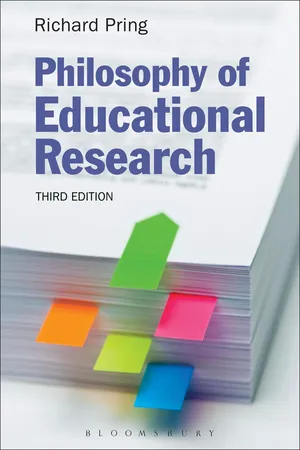
- 256 pages
- English
- PDF
- Available on iOS & Android
eBook - PDF
Philosophy of Educational Research
About this book
This classic text in educational research literature has been thoroughly updated to take into account new philosophical theories and the current political context for educational research. Remaining, however, are the three, key central themes: the nature of social science in general; the nature of educational enquiry in particular; and the links between the language and concepts of research, on the one hand, and those of practice and policy on the other. In analyzing and interrelating these themes, Richard Pring shows their relationship to such central philosophical concepts as meaning, truth, and objectivity.
Frequently asked questions
Yes, you can cancel anytime from the Subscription tab in your account settings on the Perlego website. Your subscription will stay active until the end of your current billing period. Learn how to cancel your subscription.
No, books cannot be downloaded as external files, such as PDFs, for use outside of Perlego. However, you can download books within the Perlego app for offline reading on mobile or tablet. Learn more here.
Perlego offers two plans: Essential and Complete
- Essential is ideal for learners and professionals who enjoy exploring a wide range of subjects. Access the Essential Library with 800,000+ trusted titles and best-sellers across business, personal growth, and the humanities. Includes unlimited reading time and Standard Read Aloud voice.
- Complete: Perfect for advanced learners and researchers needing full, unrestricted access. Unlock 1.4M+ books across hundreds of subjects, including academic and specialized titles. The Complete Plan also includes advanced features like Premium Read Aloud and Research Assistant.
We are an online textbook subscription service, where you can get access to an entire online library for less than the price of a single book per month. With over 1 million books across 1000+ topics, we’ve got you covered! Learn more here.
Look out for the read-aloud symbol on your next book to see if you can listen to it. The read-aloud tool reads text aloud for you, highlighting the text as it is being read. You can pause it, speed it up and slow it down. Learn more here.
Yes! You can use the Perlego app on both iOS or Android devices to read anytime, anywhere — even offline. Perfect for commutes or when you’re on the go.
Please note we cannot support devices running on iOS 13 and Android 7 or earlier. Learn more about using the app.
Please note we cannot support devices running on iOS 13 and Android 7 or earlier. Learn more about using the app.
Yes, you can access Philosophy of Educational Research by Richard Pring in PDF and/or ePUB format, as well as other popular books in Education & Education General. We have over one million books available in our catalogue for you to explore.
Information

1
Setting
the
scene:
criticisms
of
educational
research
Criticisms
Until
the
1970s,
public
financing
of
UK
universities
assumed
a
close,
if
not
essential,
relationship
between
teaching
and
research.
Therefore,
a
substantial
proportion
of
university
income
(approximately
one-third)
supported
that
research.
Then
came
a
change
of
policy.
Was
all
that
research
worth
supporting?
Many
believed
that
this
money
was
not
well
spent,
and
this
was
reflected
in
Britain
(with
respect
to
educational
research)
in
the
‘Hillage
Report’
(1998),
sponsored
by
the
Department
for
Education
and
Employment.
It
argued
that
research
does
not
provide
answers
to
the
questions
Government
●
●
asks
in
order
to
decide
between
alternative
policies
on
‘what
works’;
does
not
help
teachers
in
their
professional
practice
(e.g.
●
●
in
the
most
appropriate
teaching
methods);
is
fragmented
–
lots
of
bits
and
pieces
which,
though
●
●
often
addressing
similar
questions,
start
from
different
positions
or
use
different
samples,
not
creating
a
coherent
and
reliable
basis
for
practice
or
policy;
and
Table of contents
- Cover
- Half-Title
- Also available from Bloomsbury
- Title
- Copyright
- Contents
- Foreword to Third Edition
- 1 Setting the scene: criticisms of educational research
- 2 ‘Doing philosophy’: defining what you mean
- 3 The focus of educational research
- 4 Research methods: philosophical issues they raise
- 5 Quantitative and qualitative research: a false dualism
- 6 Key concepts and recurring conflicts
- 7 Competing philosophical positions
- 8 Research into practice: action research and practitioner research
- 9 Quality of educational research
- 10 Ethical dimensions to educational research
- 11 Political context
- 12 Conclusion: the nature and future of educational research
- Select bibliography
- Index